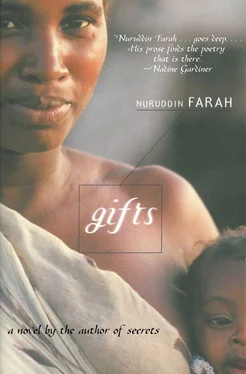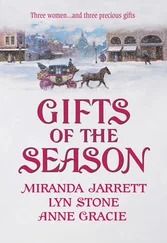Nuruddin Farah - Gifts
Здесь есть возможность читать онлайн «Nuruddin Farah - Gifts» весь текст электронной книги совершенно бесплатно (целиком полную версию без сокращений). В некоторых случаях можно слушать аудио, скачать через торрент в формате fb2 и присутствует краткое содержание. Год выпуска: 2011, Издательство: Arcade Publishing, Жанр: Современная проза, на английском языке. Описание произведения, (предисловие) а так же отзывы посетителей доступны на портале библиотеки ЛибКат.
- Название:Gifts
- Автор:
- Издательство:Arcade Publishing
- Жанр:
- Год:2011
- ISBN:нет данных
- Рейтинг книги:3 / 5. Голосов: 1
-
Избранное:Добавить в избранное
- Отзывы:
-
Ваша оценка:
- 60
- 1
- 2
- 3
- 4
- 5
Gifts: краткое содержание, описание и аннотация
Предлагаем к чтению аннотацию, описание, краткое содержание или предисловие (зависит от того, что написал сам автор книги «Gifts»). Если вы не нашли необходимую информацию о книге — напишите в комментариях, мы постараемся отыскать её.
Gifts — читать онлайн бесплатно полную книгу (весь текст) целиком
Ниже представлен текст книги, разбитый по страницам. Система сохранения места последней прочитанной страницы, позволяет с удобством читать онлайн бесплатно книгу «Gifts», без необходимости каждый раз заново искать на чём Вы остановились. Поставьте закладку, и сможете в любой момент перейти на страницу, на которой закончили чтение.
Интервал:
Закладка:
More stories were told. Duniya plied back and forth, providing drinks and snacks and Bosaaso helped her. She heard only parts of some of the other myths that Mataan and Qaasim retold, including a cynical Nigerian myth of creation in which God sits one whole day watching the Nigerians misbehave, and He just laughs. Then a Somali and a Chadian, both in tatters of threadbare famine, present themselves before God and ask why He had been so unkind to them while He had given all kinds of wealth to Nigeria. To which God replied, with tongue in cheek, “Take a good look at the people I gave to that country. You are better off where you are, I assure you.” And the Somali and the Chadian leave, gratified.
Duniya thought that at the centre of every myth is another: that of the people who created it. Everybody had turned the foundling into what they thought they wanted, or lacked. In that case, she said to herself, the Nameless One has not died. He is still living on, in Bosaaso and me.
III. Duniya Loves
12
In which the foundling is buried and formalities with regard to the rites of burial are dealt with quietly. Later that day Duniya is invited out to a restaurant.
Duniya awoke with a start and she remained restless for some time, turning and tossing in her bed, in utter discomfort. She had dreamt of a dog, of indistinct breed, ugly and short-muzzled like a bulldog; and of a rowdy lot of teenaged boys and girls teasing him, the dog barking, his frightened tail timidly glued to trembling legs, and the teenagers having fun tormenting him.
At a handsome distance from the noisy youths, as though trying to separate herself from them, stood a woman bearing no resemblance to anyone Duniya had ever met, a woman who in some inexplicable manner appeared to share an atavistic bodily and spiritual closeness to the hound, in that she had a feral stare and sharper canine teeth than any Duniya had seen in the mouth of a human. At any rate, Duniya’s attention rested on the woman who, with an expectant air, kept looking to, her right. Was she waiting for someone coming from that direction? Duniya picked out the figure of a man lying on his back on the bare ground and out of whose middle a tree with a single leaf sprouted. The dog barked now at the bullying youths, now at the woman who seemed totally unaware of him, then again at the man who stayed impervious to all around him, and finally at the twiddly leaf, easing his nervous cries at the appearance on the scene of an eagle, quiet as its folded wings, an eagle which alighted on the tree: the tree forfeited its one and only leaf, its wholeness, its life.
Silence fell.
Meanwhile, the woman seemed to search her head for clues to the significance of what was taking place. The eagle focused his powerful eyes on the dog, now silent. The dog fixed on a snake whose arrival created a troubled stir in everyone, save the woman. But there were agitated movements all round. And there erupted a gust of wind enveloping everyone and everything in its mysterious activities, a whirlwind gathering dust, spiralling upwards; whereupon the woman’s eyes were touched for an instant by happiness. Also, doubt stole over her hard stare, softening it into the sweetest of smiles.
And the snake bit the woman.
And the skies were awash with the colours of seaweed.
Her gait eloquent as a sleepwalker’s, the woman strode away from the scene, the rowdy youths and the dog following, stopping only when they came upon the cot in which a baby’s corpse lay.
At this Duniya woke.
Burying the foundling was a quiet affair, attended only by family, friends and the priest invited to minister a simple religious ceremony Bosaaso’s cousin’s taxi provided transport for those without their own who wished to join the procession. Mire could not come, Taariq could not get away from work, whereas Qaasim arrived very late, just as they were leaving the cemetery When the corpse was interred and all formalities done with, Bosaaso and Duniya drove straight to the district police station to inform the authorities of the baby’s death. The inspector was deeply saddened by the news, saying, “Why, it was only yesterday the foundling was in the news, a living testimony to Duniya’s generous spirit.” The inspector doubted if the media would be interested in carrying the news of his demise.
From the district police station Duniya and Bosaaso went to the hospital, where they discovered she had been assigned light duty for the day. Her colleagues expressed their full sympathy, one and all, and she remarked to herself how touching it was that they spoke to her as though she had lost a baby of her own flesh and blood, not a foundling. All the while, tributaries of tears worked their way up from her chest, her nose snorting, eyes blinking, their lids closing and opening of their own accord: this ended in her larynx bursting into an explosive sobbing, her mouth slobbering with the spermy saliva of slovenly secretions. But her eyes remained absolutely dry.
Even so, some inner worry drummed in the ears of her heartbeat. And she yawned ominously, feeling she had been emptied of her natural strength, and that a change had taken place inside her. A mantle of mystery hung over why the foundling’s death should affect her in ways she hadn’t imagined possible. She felt dissipated. Worse, she felt emptied of possibilities of what to do with herself, her time, what to say about him who had come and gone, what to think, how to think clearly. Sadness showed itself in her look now and again. Her posture ungainly, her legs a little shaky, the soles of her feet riddled with thorn-stings sharp as needles, Duniya sat down, sensing the state of her weightlessness. Indeed, the fear that she might fly off was so over-powering that she held on to the back of the chair, incapable of gauging its effects on her bodily behaviour. Only when she thought about Bosaaso did it seem worth her while to stay put.
Again she was won over by the memory that their house appeared emptied of life too, the radio silenced and every single door securely locked. Duniya was glad to be moving, in anticipation of happier days. Her children, in the meantime, had gone their different ways, Yarey opting to spend the day with Marilyn, Mataan with Waris, and Nasiiba — who knows what surprises she might spring on her mother when she finally re-emerged. An empty house is a sad thing, Bosaaso had said, but a vacuous life is a sadder one.
He gained courage and began taking more and bolder decisions, speaking of filling their evenings and empty late afternoons with activities. We would do this, he would say, we would do that. We would learn to swim. We would go out to restaurants. We would leam how to drive vehicles, in the hope of becoming independent, no longer in need of being given lifts, or even pestered by terrible men. We, it turned out, was a composite person (Duniya + Bosaaso = we!), able to perform miracles, capable of filling days and nights with delightful undertakings worth an angel’s time.
When the baby had been alive neither Duniya nor Bosaaso had thought of inventing things to occupy them: he had made life take shape around them. And people came, visitors arrived in hordes, to play cards, to consume tea, to tell each other stories and to become friends. Duniya couldn’t help taking account of the fact that the foundling’s death imposed a compulsory set of grammatical alterations on their way of speaking, producing a we that had not been there before, a we of hybrid necessities, half real, half invented.
The light duty which Dr Mire had assigned to her today consisted principally of receiving the in-patients’ X-ray plates and registering their names against the spaces allotted, only that. She would stare for an endless number of minutes at the negatives of the X-rays, fascinated, dreamy-looking, her fingers absently tracing the multi-wrinkled reproductions, thinking (how weird!) of a dead foetus preserved in a jar filled with clear vinegar — my God, how very shocking, she said to herself sadly Part of her imagined the blank emptiness of the cryptographic plates to represent the baby’s death and the filled spots to stand for those occupied by Bosaaso.
Читать дальшеИнтервал:
Закладка:
Похожие книги на «Gifts»
Представляем Вашему вниманию похожие книги на «Gifts» списком для выбора. Мы отобрали схожую по названию и смыслу литературу в надежде предоставить читателям больше вариантов отыскать новые, интересные, ещё непрочитанные произведения.
Обсуждение, отзывы о книге «Gifts» и просто собственные мнения читателей. Оставьте ваши комментарии, напишите, что Вы думаете о произведении, его смысле или главных героях. Укажите что конкретно понравилось, а что нет, и почему Вы так считаете.











